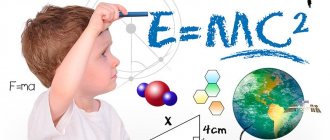When it comes to an intelligent person, the imagination imagines a mathematician who solves questions that are incomprehensible to most, who is able to solve a problem in his head so quickly that an ordinary person does not even have time to write it down. This represents the traditional idea of reason as a unique skill associated with abstract thought.
In 1994, psychologist Howard Gardner proposed an idea that would change society's typical understanding of intelligence: the theory of multiple intelligences. According to it, there is not one, but 8 types of intelligence, which develop differently in each individual. “This is the main challenge to education,” says the psychologist.
Types of intelligence are divided into 8 categories:
- Linguistic.
- Logical-mathematical.
- Visual-spatial.
- Musical.
- Bodily-kinesthetic.
- Intrapersonal (existential).
- Interpersonal (social).
- Naturalistic.
According to Gardner's intelligence types, a person has an innate tendency to perform certain actions. This determines what type a particular person should be classified as.
Therefore, some people are very smart in the field of mathematics, but may not be so good when it comes to interpersonal relationships. An exceptional musician may not be as gifted at expressing himself through words.
Teachers must understand students: strengths, weaknesses, vulnerable areas, ability to adapt, and also take into account which type of intelligence each of them belongs to and build learning on this basis.
Gardner believes that the human mind is made up of a set of skills that allow us to overcome personal problems and cope with difficulties. To solve various issues, it is necessary to understand that the human mind is diverse and it is important to choose a development path that suits a certain type of personality.
Intelligence, what is it?
Intelligence in Latin means knowledge. A person’s ability to adapt to the environment based on experience, analyze and apply received information in life, reflect and strive for knowledge - all these are functions of the intellect.
Until recently, it was believed that intelligence has a general function of cognition. In this connection, training was based on providing information that the student must learn. But it’s no secret that school performance is distributed approximately like this: 10% are excellent students, 40% are excellent students, 50% are C students. It turns out that only ten out of a hundred children acquire knowledge fully. The rest are either lazy or can’t, why? Howard Gardner tried to answer this question.
Intelligence - structure
First, let's define what intelligence is? Intelligence is a person’s ability to learn something new, learn and develop by accumulating experience, as well as the ability to achieve goals, solving problems along the way in one way or another. Intelligence combines the following types of cognition:
Types of knowledge
- Perception is a holistic assessment of any manifestations of the surrounding world;
- Memory - remembering, storing and recalling information;
- Thinking - the formation of ideas, concepts and judgments;
- Sensation - analysis and assessment of the impact of stimuli (both positive and negative) on the senses;
- Imagination - creating images, controlling them, forming conclusions.
Qualities of intelligence
Human intelligence has several qualities or components:
- The desire to learn something new (curiosity);
- The ability to sift out the important from the unimportant (depth of mind);
- Ability to use accumulated knowledge and experience (agility of mind);
- The ability to identify relationships, come to various conclusions along a chain of thoughts (logic);
- Ability to argue (evidence);
- The ability to adequately evaluate oneself and the world around us (criticality);
- Ability to assess a problem globally (breadth of thinking).
Distribution of functions between hemispheres
Naturalistic intelligence
Strengths: finding a common language with nature. Naturalistic intelligence is the latest addition to Gardner's theory. His appearance was met with even more resistance than the original seven intelligences. According to Gardner, people with naturalistic intelligence strive for harmony with nature and have an interest in exploring the environment and learning about other species. These people are believed to be good at sensing even small changes in their environment. Holders of naturalistic intelligence:
- are interested in subjects such as botany, biology and zoology;
- easily cope with the classification and cataloging of information;
- enjoy camping, gardening, hiking, and outdoor exploration;
- They don’t like anything that has nothing to do with nature.
Naturally, such people become biologists, environmentalists, gardeners or farmers.
Have something to say? Leave a comment!.
Some young people believe that in old age they will lose their minds, turn into crazy old men, lose their memory and perhaps forget their own name. What frightens young people most of all is that these processes are irreversible. Fortunately, all the described phenomena cannot be called true. Human intelligence is a rather plastic material that is capable of increasing, developing and growing throughout life. But for this, a person must comply with one condition - to conduct constant training for his brain.
Intrapersonal intelligence of the profession. Intrapersonal Intelligence: What is it?
Each person has a holistic intelligence - all types are manifested to one degree or another. Dominance, combination and level of development of all species individually. Therefore, people's mental abilities differ. They choose different professions, hobbies, interests.
Developed intrapersonal (personal, intrapersonal) intelligence predominates in successful people, and is therefore very important. The main thing in it is self-knowledge. All his life a person studies himself, the motivation of his actions, and analyzes their consequences.
This research process lasts a lifetime. Only by knowing his strengths and weaknesses, sincere desires, abilities, and motivating himself, does a person move forward - towards the intended goal, and achieve success. Because accumulating knowledge about yourself without personality development is meaningless.
People with this intelligence know what they want and how to achieve it. They cope with stress, do not have conflicts, are calm, and easily find a common language with others.
A person who has achieved perfection in a certain area of activity is dominated by a certain type of activity. At the same time, intrapersonal thinking abilities are highly developed, without which success is impossible.
Intrapersonal intelligence helps manage emotions. Under the influence of this mental state, a person makes irreparable mistakes
But by directing attention to the thought process, it deprives emotions of energy and suppresses them
That is, when communicating with himself, a person asks questions about the source, cause, significance of the reaction, options for replacing it with a rational solution. It forces the brain to work, which is inactive when there is a surge of emotions.
This requires effort that not everyone is willing to put in. But success is achieved by people who make the right, thoughtful decisions, controlling their emotions.
This is important in business. In addition, successful managers have developed intrapersonal abilities to effectively interact with people
Many individuals with a predominant creative intellect were unable to use their talent due to uncontrollable emotionality. Focused on their skills, they did not develop the intrapersonal mental abilities needed in real life.
Reduced intrapersonal intelligence creates addiction:
- narcotic;
- alcoholic;
- from tobacco;
- gaming;
- from food.
Lack of emotional control makes it impossible to cope with it. Therefore, to be happy and successful, it is necessary to develop the intrapersonal type of intelligence.
LiveInternetLiveInternet
What is verbal intelligence, thinking?... Verbal-logical thinking has its own characteristics and is more characteristic of people with a mathematical mindset. This type of thinking can be developed independently with the help of special training. Verbal thinking is the competent use of words to express one’s own feelings and emotions. Unfortunately, little attention is paid to the laws of formal logic in this case. Formal transactions begin to be performed by a person at the age of eleven. At this age, the child is already able to systematize the acquired knowledge and determine the consequences, knowing the causes of a certain phenomenon. Some researchers of this phenomenon have come to the conclusion that there is a certain connection between the level of intellectual development and school performance. American psychologist David Wexler in his report says that the strength of the relationship between academic performance and verbal intelligence is much stronger than with non-verbal intelligence. 1 What is a verbal type of thinking 2 Methods for diagnosing the development of thinking 3 How is academic performance related to verbal abilities 4 Conclusion What is a verbal type of thinking... First, let's define what verbal and nonverbal intelligence is. Intelligence is a person's ability to learn and adapt to different situations. The verbal type of intelligence gives a person the ability to study and conduct a thorough analysis of the information received. After systematization, a person gets the opportunity to repeatedly reproduce the acquired knowledge in the form of a set of words. The verbal type of abilities is responsible for reflecting the severity of verbal-logical thinking. It is this type of ability that determines the literacy of using various speech patterns to demonstrate one’s thoughts. The higher the level of verbal thinking, the easier it is for a person to acquire new knowledge and use it in later life. Thus, people with a verbal type of thinking are excellent speakers and easily understand humanitarian subjects. When conducting psychological diagnostics and assessment of thinking, special methods are used that are aimed at analyzing a person’s capabilities in comparison, generalization, eliminating unnecessary things and searching for synonyms. Knowing the level of development of verbal thinking, one can determine the propensity to study foreign languages and the ability to assimilate the material being studied. This type of thinking develops in childhood, at a time when the child tries to connect the learned words into the first, independently pronounced sentences. A certain stage of development of this type of intelligence is the study of written literacy. In order to facilitate the process of learning to read for a child, one should correctly approach the analysis of the assimilation of the information received. In most cases, a child shows signs of readiness for this form of learning between the ages of five and seven. Verbal thinking is an integral component of the successful assimilation of acquired knowledge. This applies to both humanitarian and technical subjects. When the child’s level of development has a certain significance, the process of assimilation of new knowledge proceeds quite easily. The child not only understands the meaning of the information received, but also has the ability to retell what he has learned in his own words. What are verbal abilities? Each type of intelligence, be it verbal intelligence or non-verbal, is of high importance for a person. Nonverbal type of intelligence - based on the basis of spatial objects and visual images. Visual objects operate here. The ability to find similarities and differences between objects and images, as well as the ability to correctly determine their position, is a clear example of nonverbal thinking. This type of development helps a person read various diagrams and drawings, create designs and paint. Emphasis on the development of verbal abilities promotes the acquisition of various language systems. Each language system consists of certain elements and rules for creating structures from these parts. Most language systems include: syntax; phonetics; vocabulary; grammar. Phonetics is the sound component of a language. With developed verbal abilities, a person demonstrates ease in distinguishing sounds and the ability to correctly pronounce an unfamiliar word the first time. Grammar involves the correct construction of phrases, where words are consistent with each other. Syntax is the correct formatting of sentences that allows them to be connected with each other. Thus, verbal ability is one of the main components of a rich vocabulary. All of the above allows a person to establish communication with other people. High development of intelligence makes it possible not only to competently explain your thoughts to your interlocutor, but also to substantiate your point of view. Insufficient development of communication abilities leads to difficulty communicating with other people. Non-verbal communication is also of great importance, as gestures, facial expressions and body position are part of the expression of one's own emotions. Both types of communications are the only way to transfer information from person to person. Verbal intelligence is the type of intelligence that allows you to analyze and systematize received verbal information. Today, there are several methods for testing verbal and nonverbal development. The main differences between these methods are the material used for the tests and the tasks themselves. Analysis of the level of verbal development is carried out on the basis of comparisons, synthesis and analysis of verbal materials. During diagnostics, it is imperative to take into account the age of the person undergoing testing. To check the level of verbal development, a special test developed by G. Eysenck is used. The level of development of nonverbal thinking is determined using tests based on visual objects. While completing such tasks, a person must directly interact with various objects, making complex structures out of them and drawing analogies between individual elements. This diagnostic method includes the use of such objects as the Seguin form board, the “Kosa Cube” and the Raven matrix. There are diagnostic techniques that allow you to evaluate both forms of thinking in one step. Such diagnostic methods include the Wechsler development test. Please note that this test requires a long time period of two hours to complete. How is academic performance related to verbal abilities? Thinking based on images and associative series has its advantages. People with this type of thinking have a flexible mind, capable of switching attention from one task to another within a few minutes. Also, this category of people shows a rich imagination and a high level of emotionality. Such people are often called lyricists, due to the lack of a possible objective assessment of the world around them. For lyricists, the world around a person is extremely interesting and exciting. Speaking about this, it should be mentioned that lyricists and logicians are eternal opposites of each other. In order to determine which category of people a particular person belongs to, special tests are used. During testing, the level of erudition is revealed, as well as the ability to identify common features in the writing of specific words. Usually in these tests there are certain pitfalls in writing specific words. If you find a specific version of the cipher, then in the future it will not be difficult to cope with similar tests. When examining the question of what verbal abilities are, you need to pay attention to the fact that every second a person is in a stream of different thoughts. Thoughts that haunt you hinder the achievement of effect and results. The thought process can cause serious fatigue at the end of the working day. This means that the ability to discard secondary tasks and focus on completing the main task is one of the manifestations of the presence of verbal abilities. Verbal abilities are properties of thinking that reflect how pronounced a person’s verbal and logical thinking is. Conclusion Verbal intelligence is the ability to put acquired knowledge into practice. We should make a small digression and say that there is a clear relationship between nonverbal thinking and verbal intelligence. A decrease in the level of development of one of these qualities is automatically reflected in the second type of thinking. Lack of development of spatial thinking, problems with determining the shape and size of surrounding objects lead to problems with the development of the speech apparatus. This may result in confusion of words and incorrect production of sounds. Lack of verbal development leads to impaired perception of information.
Life is an endless repetition. What we misunderstood the first time happens to us again. A little bit different. If we still do not understand, the event is returned until we fully understand the lesson. Bernard Werber
Quote #105
Rigid character and WORRIED rigid thinking are our main enemies... EVERYTHING ELSE IS OVERCOME... You are a master in what you have experienced, a craftsman in what you are experiencing, and an amateur in what you are about to experience.
Richard Bach Richard Bach. Messiah Pocket Guide
Quote #105
The main thing - do not lie to yourself.
He who lies to himself and listens to his own lies reaches such a point that he no longer discerns any truth either in himself or around him, and therefore begins to disrespect both himself and others. Not respecting anyone, he ceases to love, and in order, not having love, to occupy himself and entertain himself, he indulges in passions and coarse sweets and reaches the point of complete bestiality in his vices, and all from continuous lies both to people and to himself. © Fyodor Mikhailovich Dostoevsky “The Brothers Karamazov” Richard Bach. Messiah Pocket Guide
When Epictetus was asked how to take revenge on his enemy, he replied: “Try to do him as much good as possible.”
DIALECTICS Dictionary entry about the word “DIALECTICS”... 1. Philosophical science about the universal laws of movement and development of nature, human society and thinking, a scientific method of knowing the ever-moving and changing phenomena of nature and society by revealing internal contradictions and the struggle of opposites, leading to a spasmodic transition from one quality to another. "Materialistic d." 2. The very process of such movement and development.
Interpersonal intelligence. 9 types of intelligence
Natural intelligence
Determines a person’s ability to sense animals and plants. This ability was considered a gift in our evolutionary past. The great primitive hunters and gatherers had this gift. Now this type of intelligence continues to play an important role in some industries, and without it it is impossible to become a professional botanist or agronomist. Modern society, of course, has little interest in this type, because we are increasingly moving away from nature.
Musical intelligence
Musical intelligence is the ability to discern pitch, rhythm, timbre, and tone. This type of intelligence allows us to feel, create, and reproduce music. Composers, conductors, musicians, vocalists and listeners with keen ears could not do without it.
It’s interesting that only musical intelligence + an aptitude for mathematics can produce people like drummers. They tend to filter external sound very well and have good and fast counting.
Logical-mathematical intelligence
Logical-mathematical intelligence helps to count and solve complex mathematical and logical problems. Logical intelligence is usually well developed among mathematicians, scientists and detectives.
Young people with this type of intelligence are not inclined to communicate; they are usually closed. They are more interested in numbers, experiments and logic puzzles.
Existential Intelligence
An intelligence that potentially assists an individual in grappling with the deepest questions of human existence. For example, such people can put forward new theories about the meaning of life, the possibility of immortality and how people appeared on planet Earth.
Interpersonal intelligence
Interpersonal intelligence is the ability to understand and interact effectively with other people. It involves effective verbal and nonverbal communication and the ability to quickly notice differences between people. These people also have a good sense of the mood and temperament of others.
Teachers, social workers, actors and politicians by definition should have this type of intelligence, but... Young people with developed interpersonal intelligence often become leaders among their peers, not because they are stronger, but because they are interesting to communicate with, and it seems that they understand everyone's feelings.
Bodily-kinesthetic intelligence
Bodily-kinesthetic intelligence is the ability to manipulate physical objects and use various physiological skills. Such people are well oriented in time and space. Athletes, dancers, and surgeons must have well-developed bodily-kinesthetic intelligence.
Linguistic intelligence
Linguistic intelligence is the ability to think and clearly interpret your thoughts, even very complex ones, into words that everyone can understand. Linguistic intelligence is important for poets, writers, journalists and public figures. Young people with this intelligence enjoy writing, reading, telling stories and solving crossword puzzles.
Personal intelligence
Personal intelligence is the ability to understand yourself, as well as your thoughts and feelings, and use this knowledge in the process of planning your life. This type of intelligence allows a person to sensibly assess their capabilities and plan expenses wisely.
Obviously, such people are good psychologists. But at the same time, these people can be very shy.
Spatial intelligence
Spatial intelligence is the ability to think in three dimensions. Such people are well aware of the place and can mentally imagine what awaits them around the corner. They easily remember a picture, precisely a picture, of the place they are asked about or about which they are remembering at the moment.
Sailors, pilots, sculptors, artists and architects are carriers of developed spatial intelligence. People with this intelligence love mazes and puzzles. They can sit for hours drawing.
Existential
Sometimes such people are called introverts or egocentrics, but this is not entirely true. Existential intelligence is the ability to enjoy solitude. People of this type are responsible, self-sufficient and independent.
Even the smallest children of this type are aware of their strengths and weaknesses and are confident in their actions, regardless of the opinions of others. They have self-confidence, self-confidence and a clear understanding of what is right. This is the type of entrepreneur.
Multiple Minds in the Classroom: Activities for Education
With the help of Howard Gardner, educator and author Thomas Armstrong decided to apply the theory of multiple intelligences to the educational field, writing his famous book Multiple Intelligences in the Classroom in 1999.
In this book, Armstrong proposes studying and describing students' mental abilities with the goal of developing mental abilities in the classroom. The teacher himself admits that developing a profile of multiple intelligences is not something simple, however, he offers a series of statements for each type of intelligence so that we can correctly classify babies depending on whether they feel identified with these statements.
Diverse mental abilities and learning strategies
To promote students' personal development and human potential, it is important to apply teaching strategies to each student according to the type of intelligence we want to work on. For example, if we want to develop spatial intelligence, We can perform the following dynamics:
- display
- Colored signs
- Graphic metaphors
- Sketches of ideas
- Graphic symbols
On the other hand, if we want to promote interpersonal intelligence, the teaching strategies will be as follows:
- Share with your classmates
- Make collaboration groups
- Board games
- Role-playing games between classmates
Nowadays people talk about holistic child development, that is, it includes all aspects of development (physical, sexual, cognitive, social, moral, linguistic, emotional, etc.), this is the basis of the theory of Development of Multiple Intelligences.
There are two types of extreme experiences that are key to the development of intelligence that are important to take into account, crystallizing experiences and paralyzing experiences.
- First, crystallizing experiences, they are milestones in personal history, keys to the development of people's talents and skills. Often these events occur in early childhood. This experience is the one that ignites the spark of the intellect and begins its development towards maturity.
- On the other hand, paralyzing experiences exist as an analogue of the previous ones, they belong to those experiences that block the development of intelligence, they are full of negative emotions that can stop the normal development of intelligence. Feelings of fear, shame, guilt, hatred prevent you from growing intellectually. It is likely that after this experience the child decides not to go near the musical instrument or draw anymore because he has already decided that “he can’t do it.”
Spiritual Intelligence (SQ)
Spiritual Quotient is the highest of all types of human intelligence. It is spiritual intelligence that makes a person a person capable of setting life goals, searching for and finding his life mission, and comparing his actions with life values. If all higher mammals, along with humans, possess emotional intelligence, then spiritual intelligence is the prerogative of humans exclusively.
Just in development of the topic of spiritual intelligence, Stephen Covey’s next book about the so-called “Eighth Habit” appeared. As you probably guessed from the title, this book became a kind of continuation of the world-famous bestseller “The 7 Habits of Highly Effective People.”
Stephen Covey's eighth skill is the ability to find your voice and inspire others to find their voices. “Finding your voice” according to Covey is the ability to choose your life path, which does not necessarily coincide, but rather does not coincide at all with the average experience of hundreds of thousands of people. This is the ability to make your own choice in any situation. In essence, one’s voice is the “Path to Greatness” when a person lives life with meaning and awareness of its meaning. Of course, such an approach is impossible without spiritual intelligence.
In many ways, another book by Stephen Covey, “Focus on the Main Things,” echoes these ideas. Live, love, learn and leave a legacy.” Spiritual intelligence involves the ability to look back at your life and find the top few things to do first. Stephen Covey, as we see, offers his list of such “main things”:
- Live.
- Be in love.
- Study.
- Leave a legacy.
Your personal list may look a little different, but the point is the same: you should focus on the main things in your life. Also, you should not allow secondary vanity to occupy the main place and main time of your life.
This does not mean at all that a person should not or will not have to engage in routine. You will have to, however, this process can be streamlined by allocating your time to everything. By the way, the previously mentioned time management matrix can also help with this.
So now you have another answer to the question “How to become smarter?” and specific tips in which direction to develop. It is not at all difficult to determine which types of intelligence you currently have to a greater extent, and what should be given more attention. All that’s left to do is start taking action.
And, by the way, our “Cognitive Science” course, aimed at developing thinking, can help you with this. In a couple of months, you will be able to master more than two dozen effective thinking techniques that will allow you to find solutions to the most complex and non-standard problems, achieve great success and make your life better.
We wish you success and look forward to attending our programs!
We also recommend reading:
- Storytelling
- Signs of Low Emotional Intelligence
- Covey's "Eighth Habit": summary
- General Intelligence Factor
- Valentine's card from 4brain
- Cattell-Horn-Carroll theory
- Things that help you become smarter
- IQ: what is it and how is it measured?
- Intelligence and its development: several recommendations
- Several techniques of the art of thinking effectively from the book “Phenomenal Intelligence” by K. Sheremetyev
- Gardner's Theory of Multiple Intelligences
Key words: 1Cognitive science, 1Self-knowledge
Linguistic
The next type of intelligence distinguishes its owners with a special love for linguistics and everything that concerns it. It helps kids quickly learn to speak, listen, write and read. Slightly older children adore literature, they like to study foreign languages, create wall newspapers and conduct interviews. As a rule, they become bright and sociable people.
The number of professions suitable for such people is quite large. The most interesting:
- Translator;
- Journalist;
- Diplomat;
- Writer;
- Corrector.
Training for such children is best carried out in a group form.
It is important that the baby can discuss any events or facts with other people. At the same time, communication becomes the main activity for development, but reading can also be no less useful.
Emotional intellect. Key Factors of Emotional Intelligence
Emotional intelligence is talked about often and a lot today. The need to develop emotional intelligence has been proven more than once by scientists and various examples from life and business.
It is obvious that a person who has a higher level of emotional intelligence perceives reality more adequately and reacts to it and interacts with it much more effectively. This applies to almost all communications - both interpersonal and social; subjective and objective experiences; abstract and concrete concepts. Thus, emotional intelligence has become one of the new tools for business management, building effective communications and management.
Perception of information occurs through sensory systems. In this case, key areas of the brain act first, and then reactions of the autonomic nervous, muscular and other systems occur. Interaction with information, with yourself and the world around you is built depending on the degree of development of the key drivers of emotional intelligence: awareness, self-esteem, motivation, adaptability.
Drivers actually contain the basic personality traits, but they are not immutable and can develop.
Each driver can be unlocked through four skills:
- awareness through awareness of your thoughts and emotions, your body and behavior;
- self-esteem through a positive perception of the world and determination, as well as through acceptance and assertiveness (a person’s ability not to depend on external influences and assessments, to independently regulate their own behavior and be responsible for it);
- motivation through the desire for self-actualization and determination, as well as through an open perception of the new, strong goal setting and objective experience of failures;
- adaptability through conscious empathy for another person - empathy, stress resistance, decision making and communication skills.
Intelligence.
The human brain is the main organ with the help of which we are aware of the environment around us and interact with this world. All our behavior is determined by processes occurring in our heads. All information received through the senses is also processed and remembered by the brain, and stored in the far corners of our memory. Throughout the history of mankind, it has always been important for people to know how high the intelligence of a particular person is. But methods for assessing intellectual abilities began to appear only in the middle of the 20th century.
Intelligence is the ability of an individual
In an attempt to measure the level of brain development, the German-British psychologist Hans Eysenck came up with the concept of IQ testing and began to apply it in practice. And, we must pay tribute, this method is still popular to this day. However, the essence of Eysenck testing comes down to identifying a person’s logical thinking and analytical abilities. And many scientists did not agree with such a one-sided approach to identifying human intellectual capabilities. One of these scientists was Howard Gardner, a professor at Harvard University, who proposed not to reduce all people to one standard, but to consider that all people are smart in their own way, and on the basis of this postulate he developed the theory of “multiple intelligences.”
He identified nine types of intelligence that influence how we work with information. His theory explains why everyone performs differently at the same tasks.
One way or another, debates in the global scientific community regarding the study of the functional asymmetry of the human hemispheres of the human brain do not subside to this day, and there is not even a hint of consensus on this issue) Nevertheless, Gardner’s theory looks very impressive, and it has taken its rightful place in in the minds of inquisitive people, without displacing Eysenck’s theory, about which mountains of articles have been said and written, so our article will focus specifically on the “theory of multiple intelligences”
Personal intelligence
According to Howard Gardner, the structure of personal intelligence is based on a person’s attitude towards himself and the world. The author identified two types of intelligence: existential and interpersonal.
Existential intelligence allows you to understand your feelings, see the difference between them, and the ability to express them in symbolic form. Such a person is distinguished by awareness and the ability to manage his own behavior. Children who have this type of intelligence predominate are able to reason sensibly and draw the right conclusions. They are inclined to think about the meaning of life, to study philosophy and spiritual practices. Such people find it easy to plan, follow instructions and predict the future. Individuals with existential intelligence choose the profession of psychologist, teacher, priest, politician, etc.
Interpersonal intelligence gives a person the ability to subtly sense the mood of those around him. He sees the difference between temperaments, motives and intentions. Understanding people makes it possible to easily build relationships, and, on occasion, manipulate. Children with this type of intelligence quickly find contact with strangers. Sensing the mood of others, they instantly adapt. The sense of humor, charisma, sharp mind, and sociability that such individuals possess make them the life of the party and good negotiators. These people become politicians, teachers, directors, etc.
Why is intelligence different?
The very concept of “intelligence” became popular at the beginning of the 20th century. It was then that the first tests appeared. And at the same time, many psychologists started talking about the impossibility of comparing people’s intelligence in a purely quantitative way.
Intelligence is a set of qualities and properties of a person that determine the ability to think. And as with any other abilities, the lack of some qualities can be compensated by the high level of development of others. For example, in communicating with people, not very good speech development can be compensated by the ability to listen, the ability to empathize, sympathize, willingness to help, etc.
Mental abilities, like any other, are manifested in activity. You can't determine a person's intelligence level if he's just lying on the couch. The famous psychologist J. Guilford identifies more than 100 primary mental abilities associated with various aspects of human activity. And those that determine a high level of intelligence in one area are completely unnecessary in another, and therefore do not develop, and their low level is not even noticeable. Thus, the verbal abilities necessary for a teacher or writer are of little importance for a mathematician. For him, the ability to operate with numbers and logical thinking is more important.
In addition, people differ not only in the level of mental abilities, but also in the nature of thinking. The thinking of a mathematician and an artist is different, not worse or better, but simply different.
There is also creative thinking - a very special type of mental activity, which is considered the highest level of cognitive processes and is highly valued in any type of activity. But it doesn't fit into any intelligence test. Because the tests are standardized, but creative thinking is non-standard, original, and a person endowed with it cannot give an unambiguous answer to many test tasks.
Logical-mathematical
A fairly common type of intelligence can be called logical-mathematical. Children who have it do not experience any difficulties with mathematics and everything connected with it. They easily remember mobile numbers, dates or other numerical values, and also quickly solve examples and problems. The main characteristic of such people is the ability for structured analysis, simple establishment of cause-and-effect relationships, as well as systematization of all components of life.
The following professions are ideal for people with this type of intelligence:
- Analyst;
- Logistician;
- Mathematician;
- Programmer;
- Accountant;
- Detective;
- Doctor.
Logical and mathematical intelligence can be developed and maintained through regular training. Solutions to various problems, puzzles or mathematical examples are perfect. It would not be a bad idea to give the student the opportunity to apply skills in everyday life. For example, counting the cost of a basket of food or determining how much and what to buy in a store.
Development of the verbal factor of intelligence depending on professional activity
If in his professional activity a person mainly needs to operate with words as symbols, then he will need a higher level of verbal intelligence.
The level of development and efficiency of functioning of this particular structure, and, consequently, the system of operating mechanisms associated with it, have a more significant impact on the productivity of intellectual activity, for example, language teachers, than the levels of development of “mathematical” and visual-figurative thinking.
The productivity of a person’s cognitive abilities decreases due to the deformation or destruction of the system of operational mechanisms of the verbal type: abstract comparison, generalization, abstraction, analysis and synthesis.
The system of functional mechanisms of cognitive abilities (the first level of intelligence) does not undergo significant changes with age.
Spatial figurative
A person thinks and remembers a picture. Such people have excellent visual memory for faces, places, and objects. They can even reproduce in their minds a page of a book with pictures and paragraphs inside. They remember well what they have learned, but if the material is presented orally, it is almost immediately erased from memory.
They notice details that no one usually pays attention to. They can easily sense objects in space. For example, rearrange a room in your thoughts, or sketch a picture. They simply find their way even in an unfamiliar city. Such people have a well-developed inner world, so they often engage in various types of art.
They operate with thought processes in 3 dimensions. Even having been in a room once, they remember the situation.
The most suitable professions for an imaginative personality type:
- architects;
- pilots;
- sculptors;
- military;
- artists;
- sailors;
- drivers;
- engineers;
- builders.
This is interesting
The theory comes from Howard Gardner, who in 1983 was not afraid to challenge the established school of cognitive science. Unfortunately, despite all its reliability and argumentation, this theory has never gained universal recognition.
Types of intelligence according to this theory:
- Spatial. Excellent spatial orientation, both large and small. This type of intelligence is most developed among drivers of various vehicles, architects, and chess players.
- Bodily-kinesthetic. The ability to use one’s own body, which is expressed in precision of movements, balance, etc. In addition to dancers, this type is well developed among all representatives of applied professions.
- Musical. This type of intelligence is determined by a high sensitivity to sounds in all their manifestations and rhythm. Representatives are singers and players of various instruments.
- Linguistic. Developed perception of everything related to words, their understanding, combination. This type is most dominant among writers and poets.
- Logical-mathematical. The ability to grasp the relationships between symbols and facts. Most developed among scientists.
- Interpersonal. Ability to interact with other people. High ability to understand them, capture mood, attitude, emotions.
- Intrapersonal. The ability to correctly and clearly understand one’s own feelings and emotions, and find solutions to calm down.
- Naturalistic. The ability to understand the differences in nature, find the difference between plants, etc.
Visual-spatial
The mind of a child with visual-spatial intelligence adds special colors to the world. Kids get great pleasure from playing with dolls, collecting puzzles, and finding a way out of the maze. Many of them have an imaginary friend with whom they often communicate. As they get older, such people have a good sense of color, which helps them understand the combination of clothes, and easily solve problems related to geometry, drawing and drawing. They have no problems with geographic orientation or remembering new places. Their big advantage is the skill of clear visualization.
You will be most successful in the following positions:
- Artist;
- Sculptor;
- Designer;
- Architect;
- Engineer;
- Director.
Like any of Gardner's other types of intelligence, visual-spatial intelligence can be developed. To do this, it is enough to allow the child to draw more, visualizing real or fictional characters, and also regularly ask them to independently find several solutions to different problems.
Types of intelligence according to Eysenck. G. Eysenck's model of the structure of intelligence.
Hans Jurgens Eysenck, a psychotherapist at Bethlem Royal Hospital in London, developed a general concept of intelligence. He proceeds from the fact that intelligence, despite the difficulties of its definition, is the same scientific concept as gravity, electricity, chemical bonds: because they are not visible, not perceptible, and, therefore, according to some researchers, not “material”, they do not lose their cognitive value as scientific concepts. Dwelling on the difficulties of defining intelligence, he points out: this largely follows from the fact that today there are three relatively different and relatively independent concepts of intelligence. At the same time, he does not contrast them with one another and even tries to explain them “under one roof.” This combination is demonstrated in the diagram (Figure 1).
Picture 1 . Interconnectivity of different types of intelligence according to G. Eysenck
Biological intelligence is the innate, predetermined information processing abilities associated with the structures and functions of the cerebral cortex. This is the basic, most fundamental aspect of intelligence. It serves as the genetic, physiological, neurological, biochemical and hormonal basis of cognitive behavior, i.e. associated mainly with the structures and functions of the cerebral cortex. Without them, no meaningful behavior is possible. D. Wexler argues that “any working definition of intelligence must be fundamentally biological.”
Psychometric intelligence is a kind of connecting link between biological intelligence and social intelligence. This is what comes to the surface and is visible to the researcher of what Spearman called general intelligence (g). In other words, to paraphrase Boring, what intelligence tests measure is nothing other than psychometric intelligence.
Social intelligence is the intelligence of an individual, formed during his socialization, under the influence of the conditions of a certain social environment.
Classification according to T. Buzan
The structure and types of intelligence were also presented by T. Buzan. Its classification is similar to Gardner's division and is as follows.
- Logical-mathematical. Making sense of arguments.
- Linguistic. Understanding and expressing speech.
- Spatial. Visualization of an image in the mind.
- Musical. A clear sense of rhythm, harmony, tone of sound.
- Bodily-kinesthetic. Hand-eye coordination, learning things through body movements.
- Social. Interacting with others as both a leader and a follower.
- Emotional. Understanding both your own and others' emotions.
- Intuitive. Reason influencing intuition.
- Perspective. Understanding another point of view without expressing it.
- Stationary. Understanding something without any preconceptions.
Some models even approach the problem from the point of view of general CNS function. According to Gardner, general intelligence should include 8 separate types. Despite the fact that Gardner's theory has no real scientific basis, is not supported by facts, and does not sufficiently describe the actual functioning of the human brain and mind, his classification is the most often used. A similar theory of Buzan is used as a complementary one.
Interpersonal social
This is a pretty interesting type of thinking. Those with well-developed interpersonal intelligence are able to easily feel other people and have a high degree of empathy. It is typical for them to easily get along with new people, to be able to captivate them literally from the first word. They use different methods of communication: verbal and non-verbal.
They easily sense the mood of the interlocutor, so it is easy and pleasant to communicate with them. They often become leaders in the company, because they can understand those around them, help and always support others.
They like to be around other people, work with them, study, and be in constant contact. They easily understand the mood of the interlocutor, his needs and desires. They can explain the behavior of friends and acquaintances. They have a kind heart and often help others. They know how to control their own emotions.
Suitable professions:
- teacher or educator;
- psychologist;
- artist;
- HR specialist;
- Social worker.
What is verbal ability?
Well-developed verbal abilities allow a person to master the language system. It includes various elements and rules for using and connecting these elements. The language system includes:
- phonetic side of speech;
- grammatical structure of speech;
- lexical side of speech;
- syntax.
The phonetic side of speech is the sound composition of the language. Verbal abilities allow you to distinguish sounds by ear and determine the correctness of your pronunciation. In grammar, verbal abilities are manifested by correctly constructed utterances, the words in which are consistent, cases and prepositions are used correctly. In syntax - beautifully and correctly formed sentences that make up a coherent text. The vocabulary of a person with well-developed verbal abilities is usually rich.
All of the above helps in the verbal side of communication, that is, communication that occurs using speech. Highly developed verbal thinking helps to convey your thoughts to your interlocutor, convince you that you are right, and establish dialogue and joint activities. With insufficient development of these abilities, the communication process is difficult (see Dysarthria in children). Only the non-verbal side of communication (facial expressions, pantomime and gestures) does not provide sufficient information. High-quality use of speech to convey information is necessary in the communication process.











